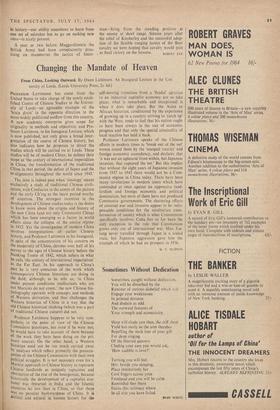Changing the Mandate of Heaven
PROFESSOR LATTIMORE has come from the United States to take charge of the newly estab- lished Centre of Chinese Studies in the Univer- sity of Leeds—an agreeable example of the 'brain drain' in the opposite direction to the more widely publicised outflow from this country. A new academic enterprise gives scope for originality in methods and objectives, and Pro- fessor Lattimore, in his Inaugural Lecture, which is now published, not only gives a broad inter- pretation of the course of Chinese history, but also indicates how he proposes to direct the studies which will be carried on at Leeds. These studies will be of modern China; he defines their scope as 'the century of international imperialism in China, the transformation of the traditional China in that period, the defeat of Japan and the re-alignments throughout the world since 1945.'
The time is indeed past when 'sinology' meant exclusively a study of traditional Chinese civili- sation, with Confucius in the centre of the picture and the early Ch'ing as the latest period worthy of attention. The strongest incentive in the development of Chinese studies today is the desire to know more about the -origins and history of the new China (and not only Communist China) Which has been emerging as a factor in world affairs since the collapse of the ancien regime in 1912. Yet the investigation of modern China involves interpretations of earlier Chinese history, and Professor Lattimore in his Inaugural, in spite of the concentration of his concern on the modernity of China, devotes over half of his survey to the ages of Chinese history before the Nanking Treaty of 1842, which ushers in what he calls 'the century of international imperialism' in the Far East. In his approach to China's Past he is very conscious of the work which Contemporary Chinese historians are doing in the field; although, as he tells us, 'in China under present conditions intellectuals who are not Marxists do not count,' the new Chinese his- toriography operates with concepts and methods of Western derivation, and thus challenges the Western historian of China in a way that the old Chinese historical thinking (which was a part of traditional Chinese culture) did not.
Professor Lattimore happens to be very sym- pathetic to the point of view of the Chinese Commtinist historians, but even if he were not, he would have to take account of them because of the work they have been doing on the pri- mary sources. On the other hand, a Western historian need not be too much carried away by analyses which reflect primarily the preoccu- pation of the Chinese Communists with their own Political struggles. It is not necessary even for a Marxist approach to Chinese history to represent Chinese landlords as uniquely rapacious and Obstructive of the rise of the bourgeoisie, because historically the development of a capitalist eco- "mY was thwarted in India and the Islamic countries no less than in China, so that there Was no peculiar backwardness of China. It is normal and natural in human history for the self-moving transition from a 'feudal' agrarian to an industrial capitalist economy not to take place; what is remarkable and exceptional is when it does take place. But the Asian or African historian, conditioned by the experience of growing up in a country striving to 'catch up' with the West, tends to feel that his nation ought to have been always in the van of economic progress and that only the special criminality of local reaction has held it back.
Professor Lattimore speaks of the Chinese efforts in modern times to 'break out of the net' woven round them by the 'unequal treaties' and foreign economic ascendancy, and declares that . 'it was not an upheaval from within, but Japanese invasion, that ruptured the net.' But this implies that without the eight years of Japanese invasion from 1937 to 1945 there would not be a Com- munist regime in China today. There have been many revolutions in modern times which have contended at once against an oppressive land- lordism and foreign economic and political domination, but most of them have not produced Communist governments. The shattering effects of external war and invasion appear to be indis- pensable conditions for the totalitarian trans- formation Of society which is what Communism specifically involves. Cuba has so far been the only exception to the rule that Communism grows only out of international war. Mao Tse- tung never never travelled through Japan in a sealed train, but Japanese aggression gave him the triumph of which he had no prospect in 1936.
a E. hUDSON
























 Previous page
Previous page